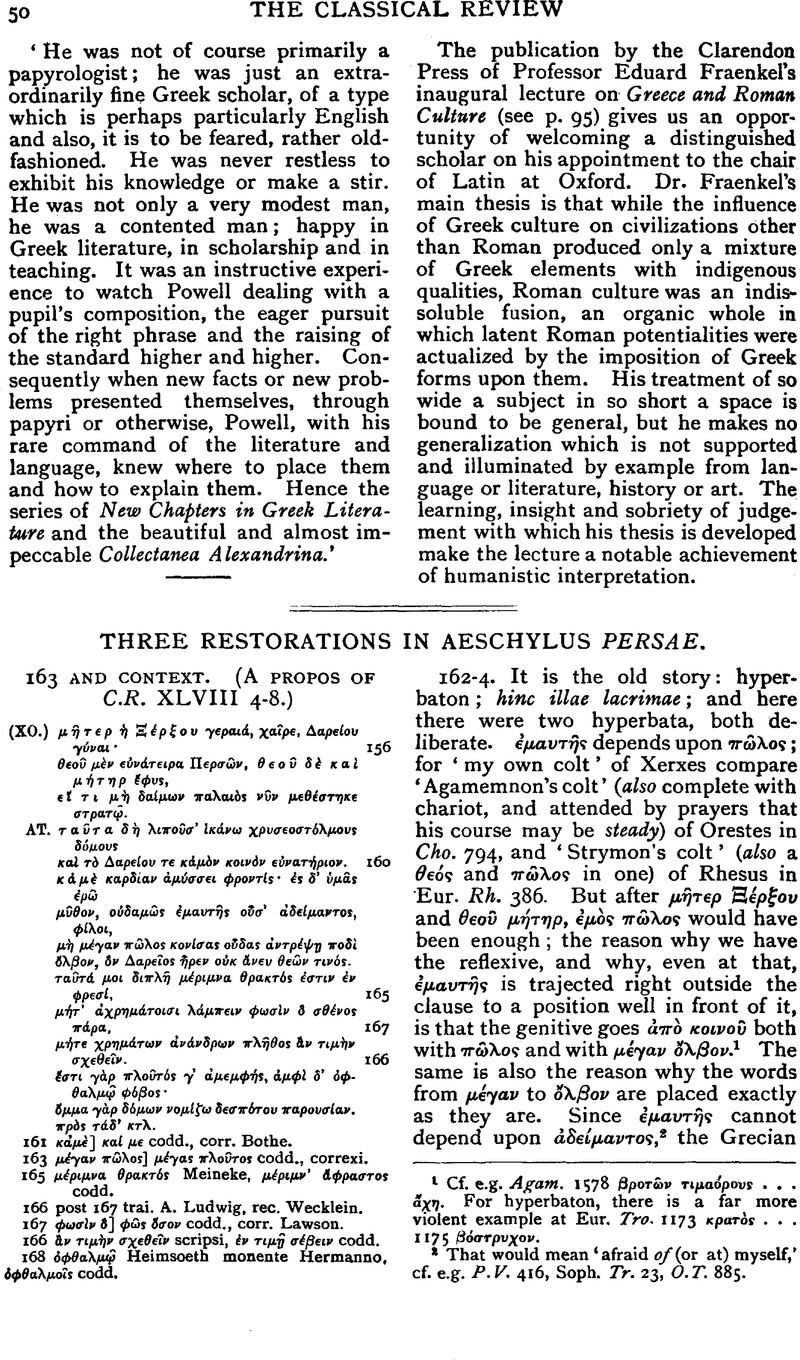No CrossRef data available.
Article contents
Three Restorations in Aeschylus Persae
Published online by Cambridge University Press: 27 October 2009
Abstract

Information
- Type
- Review Article
- Information
- Copyright
- Copyright © The Classical Association 1935
References
page 50 note 1 Cf. e.g. Agam. 1578 βροτῶν τιμαόρους ἂχη. For hyperbaton, there is a far more violent example at Eur. Tro. 1173 κρατὸς … 1175 βόστρυχον.
page 50 note 2 That would mean ‘afraid of (or at) myself,’ cf. e.g. P.V. 416, Soph. Tr. 23, O.T. 885.
page 51 note 1 And with μέγαν ὂλβ. ὃν δ. ἦρεν compare 754 f- σὺ μὲν μέκνοις πλοῆτον ἐκτήσω.
page 51 note 2 For women (especially widows) speaking of the wealth as their own cf. Soph. El. 648 f., Track. 910 f. τῆς παλαιᾶς (Housman, C. R. XXXIX. 78) οὐσίας.
page 51 note 3 Cf. e.g. Eur. lon 1106 κλεινήν (Reiske for κλειναί), γυναῖκες.
page 51 note 4 If it can be proved that there is no other possibility an emendation becomes a correction. Could ingenuity devise any alternative here? Yes, one, but it is far inferior. Before getting μέγαν (the final clue) I did entertain, for hardly one hour, οὐ δόμοις ἐμοις …μὴ μέγας στῦλος κτλ. See Eur. l.T. 57 and imagery in context; and the human στῦλος of a house has feel, Agam. 897–8. I have formulated the various objections, but surely nobody would require them.
page 51 note 5 Under κρηνίς, on the other hand, they give no reference, even ex coni., to this play, where it very properly appears in the Oxford text (815).
page 52 note 1 Dindorf, Lex. s.v., explains ἀνάνδρων ‘ i.e. virorum domo absentium.’ Not a bit; what sort of an army is it that has to be kept always at home? Each bride at 289 (ἀνάνδρους) laments her lord, not the whole army. The city is not ἂνανδρον but κένανδρον, 119. The fact is, the trouble here has been complicated by a mistaken extension of the reference in παρουσίαν at 169; that is just a Greek redundancy (ὄμ. δομ.=εδπότης when present; cf. παρών passim), and does not represent Atossa's anxiety about Xerxes, which is for his success and not his presence, as 176–214 shows. χρήματα χρήματ’ ἂνήρ is the contrary sentiment.
page 52 note 2 Besides, the syntax of the relative clause is ambiguous in codd. (supply αὐτοῦς or αὐτῷ?), with Lawson it has the given dative ἀπὸ κοινοῖ.
page 52 note 3 The point here is Athenian anti-Persian irony; the personal self-importance of the despotic House; cf. 214, a tonic line of the drama, most unhappily transformed by Lawson into a democratization of Persia! The ironic personality reaches an extreme at 845–51.
page 52 note 4 And look at the length of the homoearchon, ten letters; that shows what happened.
page 53 note 1 Not δι', apparently; see Wilamowitz. With the too obvious but helpless emendation διάγοιεν I do not reckon.
page 53 note 2 Dindorf had already, I find, placed δυνάοτα after θανὼν, but he quite needlessly removed φίλοισι.

